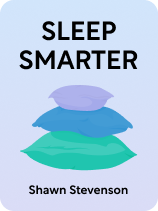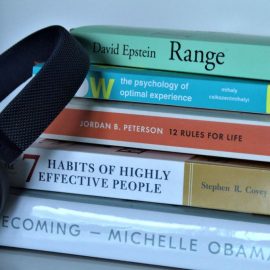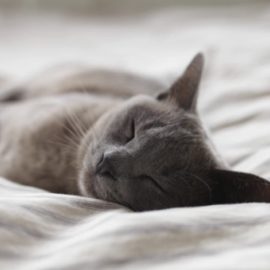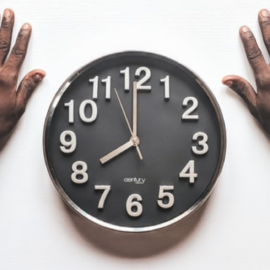

This article is an excerpt from the Shortform book guide to "Sleep Smarter" by Shawn Stevenson. Shortform has the world's best summaries and analyses of books you should be reading.
Like this article? Sign up for a free trial here.
What’s Sleep Smarter by Shawn Stevenson about? What factors affect how much you sleep?
In Sleep Smarter, Shawn Stevenson explores the importance of sleep and the role of circadian rhythms. He also looks at the impact of one’s sleep environment and the unexpected benefits of sweet potatoes.
Read below for a brief overview of Sleep Smarter.
Overview of Sleep Smarter by Shawn Stevenson
In Sleep Smarter, Shawn Stevenson asserts that high-quality sleep is the key to a healthier body, sharper mind, and overall increased quality of life. He provides a wide array of practical suggestions to help us achieve a good night’s sleep, incorporating nutrition, exercise, sleep habits, and aspects of our environment.
Stevenson is an educator, author, and professional nutritionist in the health and wellness field. He hosts the nutrition and fitness podcast “The Model Health Show” and also wrote Eat Smarter, a cookbook designed to help families eat healthier.
Why Sleep Is Important
Stevenson writes that sleep is a vital process that allows your mind and body to rest and rejuvenate. Sleep affects almost every aspect of your overall health, including your daily energy levels, long-term cardiovascular health, and mental health. Therefore, rather than looking at sleep as an inconvenience or something you can neglect, you should regard it as an essential task. In this section, we’ll look at some of the ways sleep impacts your body and brain.
The Importance of Sleep for the Body
Stevenson asserts that when you sleep, various processes happen within you that keep your body in its best condition. Sleep is an anabolic state, meaning it aids in your body’s natural growth and repair processes of your muscular, immune, and skeletal systems. Without adequate quality sleep, these repair mechanisms don’t work properly. Additionally, sleep keeps your hormone levels balanced and improves your metabolism.
Beyond its generally negative effects on everyday health, sleep deprivation has larger, long-term implications for your health. Research indicates that not getting enough sleep puts you at greater risk of heart disease.
Further, writes Stevenson, sleep deprivation can lead you to develop insulin resistance at the same level as a person with type 2 diabetes. When you’re insulin resistant, your body ages faster, and you build up more fat.
The Benefits of Sleep for the Brain
Stevenson writes that in addition to its effect on the health of your body as a whole, sleep strongly impacts the health of your brain. Human brains are incredibly complex, and the various functions they serve while we’re awake produce waste products. These waste products, along with toxins and dead cells, need to be removed for your brain to stay healthy.
Sleep enables this waste removal. While you’re sleeping, your glymphatic system—the brain’s waste removal system—is 10 times more active than it is when you’re awake. Additionally, your brain cells shrink by about 60% during sleep, allowing the tidying-up process to become more efficient. When you don’t get enough quality sleep, your brain doesn’t have the chance to complete this process, and the waste products stay in your brain. Over time, this can have serious consequences, including the development of Alzheimer’s disease.
Habits for Healthy Sleep
Stevenson writes that to reap the benefits of quality sleep, you need to align your sleeping habits with your circadian rhythm—the internal system designed to regulate your biology and behavior. Your circadian rhythm acts like a 24-hour timer, telling you when to sleep and when to wake up, coordinating with the cycles of day and night.
Stevenson advises incorporating three habits into your daily routine to better align your sleep cycle with your circadian rhythms: exposing yourself to sunlight in the early morning, reducing your screen time before bed, and timing your sleep to get the most benefits.
Habit #1: Get More Sunlight in the Morning
Stevenson writes that your circadian rhythms are controlled by a collection of nerves in your hypothalamus, the part of the brain responsible for regulating all hormones. One of the main triggers of these nerves is sunlight. To help regulate your sleep cycle, he thus suggests getting more sunlight—particularly in the morning. When you expose yourself to sunlight in the morning, it signals to your hypothalamus that it’s time to wake up, prompting the release of hormones that make you more alert and trigger important biological processes, such as hunger and thirst.
Morning sunlight exposure also prompts your body to produce hormones needed for a normal sleep cycle. Stevenson details three of these hormones: serotonin, melatonin, and cortisol.
Serotonin
Most people know serotonin as the hormone that creates a feeling of security and happiness, but it also plays an important role in regulating sleep cycles—in part by aiding in the production of melatonin (discussed below). Our brains produce serotonin when sunlight hits our eyes, and our skin also produces it when exposed to sunlight.
Melatonin
Melatonin prepares your body for sleep at the cellular level, thus improving the quality of your sleep. Your melatonin production is highly correlated to your exposure to light: Your body produces it as it gets darker in the evening, and getting more light during the day—and less at night—helps to ensure this process happens effectively.
Cortisol
Cortisol is the hormone that most directly influences your circadian rhythms. Your body produces a surge of it in the morning, waking you up and helping you stay alert and focused throughout the day. Then, your cortisol levels fall during the day, so by the time the evening arrives, you’re ready for sleep.
If your cortisol levels are too high or too low at the wrong time, you may be tired when you’re supposed to be awake or alert when you’re supposed to be sleeping. Getting the right amount of light—particularly sunlight—during the day ensures that your cortisol levels rise and fall when they’re supposed to.
Habit #2: Reduce Screen Time at Night
Stevenson warns against using technology, especially screens, close to bedtime. He explains that artificial light—specifically blue light emanating from devices like smartphones, tablets, computers, and even televisions—can interfere with your body’s circadian rhythms.
This is because blue light sends signals to your brain that it’s still daylight, triggering the production of cortisol and delaying the production of melatonin. You become awake and alert when you should be feeling sleepy. If you consistently use technology before bed, you can chronically disrupt your circadian rhythms, leading to more serious health issues over time.
Stevenson recommends halting the use of your devices at least 90 minutes before heading off to bed and replacing that screen time with calming activities such as reading a book (a physical one—not an e-book), taking a warm bath, or practicing gentle yoga stretches. These activities help signal to your body clock that it’s time to wind down and prepare for upcoming rest hours.
Habit #3: Get the Timing of Your Sleep Right
According to Stevenson, the timing of your sleep affects the quality of it. The best time to sleep—the optimal time for your body to make repairs and the time window in which your body is best able to produce the right hormones—is from 10:00 PM to 2:00 AM. During these hours, your body produces the most melatonin and human growth hormone (which helps your body stay youthful). If your sleep schedule isn’t aligned with the 10:00 PM to 2:00 AM window, you may feel unrefreshed and tired even if you got a full eight hours of sleep.
The process looks like this: Around 10:00 PM (a few hours after sunset), your body gets a natural boost of melatonin. This cues an increase in your internal metabolic energy, which is used for the repair processes we discussed earlier, including the production of antioxidants that protect your DNA.
This only works, however, if you’re asleep—if you’re still awake around 10:00 PM, you’ll feel a burst of energy, even if you were just tired. Instead of being used to rejuvenate your body while you rest, this energy goes toward waking activities like scrolling through your phone. You’ll probably have a harder time falling asleep when you get around to it, and you might wake up without feeling rested.
The Best Bedroom Conditions for Sleep
In the last section, we explored how your body’s natural timing system affects your sleep. Now we’ll examine another factor that influences sleep quality: the environment of your bedroom. In this section, we’ll look at two changes you can make to your sleep environment: sleeping temperature and bedroom air quality.
Sleeping Temperature
Stevenson suggests that keeping your bedroom slightly cold can help improve sleep. This is because your body naturally cools down as you prepare for sleep, so if your body temperature is too warm, your body will remain in a state of wakefulness. By making your surroundings cooler, you’re thus making it easier for your body to enter a restful state.
The ideal temperature for the room you sleep in is 60 to 68 degrees Fahrenheit (15 to 20 degrees Celsius). If the temperature in your bedroom is too far outside of this range—either too high or too low—you’ll likely have trouble sleeping. In addition to changing the settings on your thermostat, there are products such as cooling mattress pads that can help you keep your body at the ideal sleep temperature.
Bedroom Air Quality
Stevenson states that the quality of air in your bedroom can also affect your ability to sleep well. He argues that you sleep better when breathing air that’s rich in negatively charged ions. These ions eliminate toxins and allergens such as mold, chemical gasses, dust, and pollen. The negative ions themselves also energize your body for higher performance of its regular chemical processes. However, when air sits around in a stuffy, enclosed environment, the ions in the air naturally lose their negative charge. Therefore, you can ensure the bodily health you need to get a good night’s sleep by circulating airflow, either through a fan or open window, to keep ions from losing their negative charge.
Finally, keeping some houseplants in your bedroom can improve its air quality. Many common houseplants absorb toxic chemicals and release oxygen.
Lifestyle Factors That Affect Sleep
In the previous section, we discussed multiple ways you can create an ideal environment for sleep in your bedroom. In this final section, we’ll look at common lifestyle factors that can change the quality of your sleep. First, we’ll explore the foods and beverages that can help and hinder your ability to sleep. Then, we’ll examine the relationship between exercise and sleep.
Foods and Beverages That Impact Sleep
Stevenson discusses how your dietary choices impact your sleep patterns and quality. Certain foods and drinks can either help to promote a restful sleep or disrupt it.
Caffeine
Stevenson names caffeinated beverages as one of the main offenders causing sleep disruption. While consuming caffeine isn’t inherently bad, doing so too close to bedtime—typically, within six hours of it—can interfere with your ability to fall asleep. To fully understand why caffeine is so disruptive, we need to first consider a chemical called adenosine. Your brain naturally produces adenosine when you’re awake, and your nervous system regularly measures the amount of adenosine in your body to determine whether you’ve been awake for too long. The more adenosine your nervous system finds, the more tired it will make you feel.
Caffeine disrupts this cycle because it has a similar molecular shape to adenosine. It therefore connects with your body’s adenosine receptors and blocks adenosine from triggering them. Therefore, your central nervous system “misreads” how tired you are, believing that you’ve been awake for less time than you actually have. This prevents you from naturally falling asleep when you’re tired.
This creates a damaging cycle: Caffeine stimulates your nervous system and prevents the onset of natural sleepiness. After not sleeping well, you wake up tired, and you need to consume more caffeine to feel awake. Then, the high amount of caffeine you consume continues to disrupt your sleep, starting the loop over again.
Alcohol
Alcohol is another beverage to avoid before bedtime. Stevenson asserts that though alcohol may help you fall asleep faster, it hinders your ability to experience REM sleep. REM sleep is the stage in your nightly sleep cycle when you dream, and it’s a vital part of memory processing in your brain. Your brain needs REM sleep to prepare short-term memories for long-term storage. Without it, your memory and overall health will decline.
Additionally, alcohol can disrupt your sleep by increasing your need to urinate. Each time you get up to visit the bathroom, it breaks up your normal sleep cycle. The alcohol in your system then makes it unlikely you’ll get back into the right stage of sleep. To avoid alcohol-related sleep problems, Stevenson recommends stopping your consumption of alcoholic drinks at least three hours before you plan to go to sleep.
Nutrients That Improve Sleep
Stevenson writes that a healthy diet can improve your sleep. He recommends getting nutrients from your diet rather than from supplements because your body can more easily recognize nutrients from whole foods. When vitamins and minerals are isolated in supplement form, they’re harder for your body to absorb.
Three nutrients in particular that Stevenson advises you include in your diet are tryptophan, vitamin C, and Omega-3s:
Tryptophan is necessary for serotonin production. You can get it from foods such as turkey, eggs, and sweet potatoes.
Vitamin C is important for staying asleep through the night. People who are deficient in vitamin C tend to wake up more throughout the night and generally have more sleep problems. You can get vitamin C from foods such as citrus fruits and leafy green vegetables.
Omega-3s contribute to sleep that is deeper and more restful. You can get omega-3s from foods such as salmon, chia seeds, and flax seeds.
Herbal Supplements for Better Sleep
When you need a little extra help getting to sleep (and staying asleep), there are several herbal supplements that might help you. Stevenson states you shouldn’t rely solely on supplements for sleep improvement, but certain ones can support and enhance the quality of sleep when used alongside other healthy lifestyle adjustments.
Kava kava is a plant from Fiji that’s typically taken as a tea. It’s a natural sedative and helps stop fatigue and sleeplessness. Research suggests that it may reduce the amount of time needed to fall asleep and improve the quality of sleep.
Chamomile is a common herbal remedy with many uses, including as a mild sedative. Drinking a cup of chamomile tea at night can help you fall asleep by relaxing your nervous system and releasing muscle tension.
Valerian is a stronger sedative. It helps you to fall and stay asleep. Its medicinal benefits come from the root, and it can be taken in tea, tincture, or capsule form.
The Exercise-Sleep Connection
Stevenson writes that sleep plays a key role in determining how effective exercise is for your body. This is because it’s only when you sleep that the positive effects of exercise materialize: During a workout, you create thousands of small tears in your muscles, which don’t get repaired until you rest later, at which time your body produces hormones that repair these tiny tears. This repair process leaves your muscles stronger than they were before, leading to muscle growth—but it doesn’t happen unless you get enough sleep to allow for it.
Sleep and exercise are positively correlated in the opposite direction as well—just as sleep benefits exercise, exercise benefits sleep. Stevenson writes, though, that what time of day you exercise makes a big difference in how much it improves your sleep, arguing that working out in the morning produces the greatest positive effects. This is because morning exercise encourages your body’s natural release of cortisol that helps to wake you up every day, h. This helps normalize your 24-hour sleep cycle, and thus, people who exercise in the morning typically sleep deeper and longer.
Stevenson advises not to exercise shortly before going to bed. When you exercise, you significantly increase your core body temperature, so if you exercise too late in the day, your body temperature may still be too warm by the time you want to go to bed. Exercising also induces the release of stress hormones that keep you alert, so it’s important to give yourself enough time for them to leave your system before bed.

———End of Preview———
Like what you just read? Read the rest of the world's best book summary and analysis of Shawn Stevenson's "Sleep Smarter" at Shortform.
Here's what you'll find in our full Sleep Smarter summary:
- How sleep affects your body, mind, and overall quality of life
- Practical suggestions for achieving a good night’s sleep
- The unexpected benefits of eating sweet potatoes






